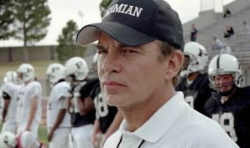Mark:
Americans are a weird, obsessive bunch. Texans are worse. At least that’s often how it seems in movies, although not more so than in Friday Night Lights. In setting out to show what playing high school football is like in small town West Texas, Peter Berg gives us a glimpse into an appalling lifestyle – a corrosive culture that destroys young men. There is nothing uplifting about this story.
In 1988, the Permian High School Panthers of Odessa, Texas, were red hot. Favourites to win the Texas State Championship, on the shoulders of their famed running back, ‘Boobie’ Miles, their town loved them. With signs on their front lawns to advertise that a Panther lived there, and radio talkback, even television interviews of coach and players, the town couldn’t get enough of them. Players were treated like stars, given special treatment. Girls wanted them. They got free food in restaurants. Their school gave them marks they hadn’t earned. In short, they were primed for a fall.
 When it comes, and their subsequent guts and determination recovery to make it to the Championship game, we are supposed to get excited and moved by their courage. Instead, I was still horrified by the culture and expectations these boys had to perform in. I failed to see that anything they did was heroic or courageous. More, I felt sorry for these kids.
When it comes, and their subsequent guts and determination recovery to make it to the Championship game, we are supposed to get excited and moved by their courage. Instead, I was still horrified by the culture and expectations these boys had to perform in. I failed to see that anything they did was heroic or courageous. More, I felt sorry for these kids.
Can any seventeen year old stay sane and well-balanced under the weight of this amount of expectation and attention? I doubt it. I wasn’t surprised to see the star of the team, Boobie Miles, unable to read the many college scholarship letters he received, especially after he told reporters that football players get good marks automatically. Or when I heard a talkback radio caller, seeking to explain the team’s loss that night, by blaming schools for trying to teach them too much – they’re there to play ball! Even the only one seemingly sane enough to get stressed and worried by all this attention, Quarterback Mike Winchell, succumbs – having anonymous sex with a groupie to prove he’s not gay. This is an awful, toxic atmosphere to grow up in, and we see it in its glory.
Sure, there are some moments of real tension and excitement, but in the end I just felt more dirty for enjoying them. The ‘redemption’ scene featuring Don Billingsley and his father in the closing minutes is one of them, however I can’t accept that suddenly all the abuse would go away after one shared moment. This was the only well-drawn character arc in the whole movie – Friday Night Lights is short on character development, leaving most of its performances one-dimensional at best – and I still didn’t believe its eventual conclusion.
The use of hand-held cinematography is another problem – much of the time we are struggling to follow the onscreen action, lost in a mire of fuzzy and poorly focused shots. I can understand the motivation may have been to give the ‘based on a true story’ film a documentary feel, but if you can’t see the players, how can you be excited? Once again, poorly shot footage makes a film suffer.
This is a barely adequate telling of the awful abuses heaped on the shoulders of children, masquerading as a feel-good tale of brotherhood and shared glory. It tells us more of the destructive culture of the participants than it means to and shows us less of their ‘heroism’ than it tries to.
Rating: